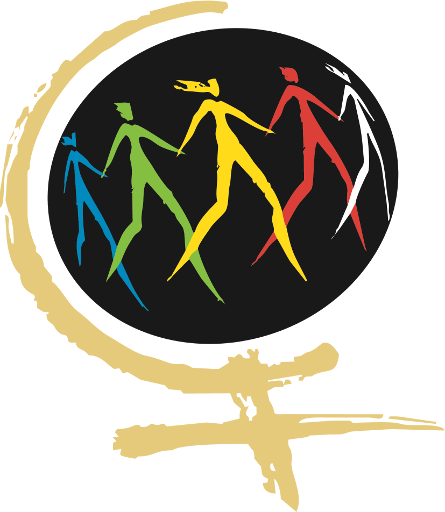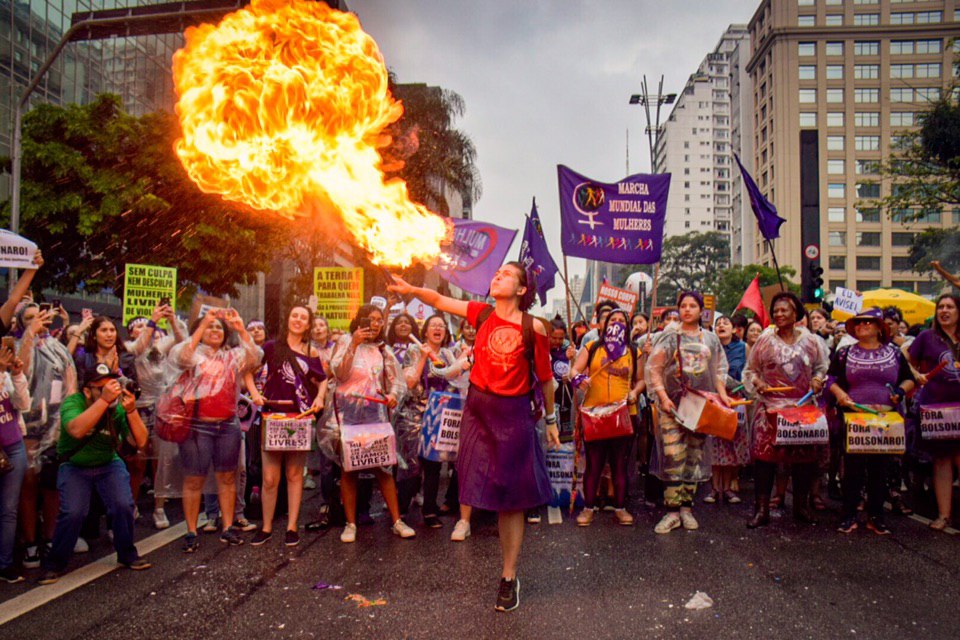At the launch of the 5th International Action of the World March of Women, on March 8, International Day of Women’s Struggle, we expressed our political position regarding the current moment with the slogan We resist to live, we march to transform! We resist and fight against the capitalist attack on life and against the increase of conservatism and authoritarianism in different parts of the world.
We resist the neoliberal and conservative offensive that attacks lives and work of women and the poor. We resist the militarization of bodies, lives and territories; we promote anti-capitalist and anti-imperialist struggles; we denounce the persecution of migrants. We face the power of transnational companies, direct agents of capital and allies of the elites of States, which advance over territories and monopolize, control and privatize the land, transform nature into merchandise and contaminate water, food and our bodies.
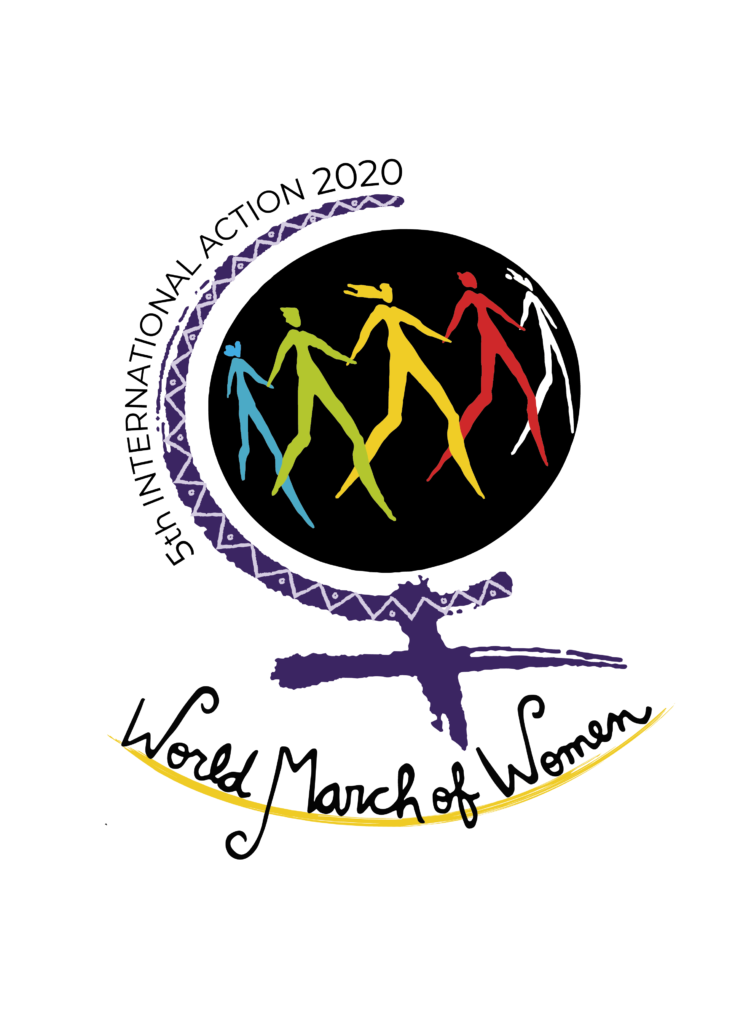
We march to transform our lives and change the world. We propose and build other ways of organizing the economy, placing the sustainability of life at the center of our priorities. From our practices, we build feminist agroecology, articulated with the struggles for climate justice and food sovereignty. We march to transform the organization of power, building from below the questioning of the hierarchies and authoritarianisms of States at the service of elites.
We march against racism, for a society without walls and for the self-determination of peoples, building an internationalist, popular and militant feminism in everyday life. We continue to learn from the native people’s ways of thinking and feeling the world that sustain life in community and cultivate joy in resistance. We march with our bodies, our voices, our rhythms and our creativity, subverting the neoliberal impositions on our subjectivities and our ways of living.
In 2020 our trajectory completes 20 years. “The World March of Women was born from an action of women who came together, around the world, to act against neoliberalism”, says Graça Samo, coordinator of the International Secretariat of the March and participant in the Fórum Mulher, in Mozambique. With an organized world movement, we contribute to repositioning feminism and affirm that changing lives of women and changing the world is only possible collectively and in movement, placing the concrete reality of women in the public space. Together with other social movements, we show that another world is possible. We resist free trade, transnationals and the looting they spread around the world.
The March 8 mobilizations were immense and the international feminist movement is bigger and more powerful than 20 years ago. We are part of this trajectory. That is why, in the launch of the 5th International Action, we marked our history of mobilization and building proposals in a collective and articulated way. We do not separate debate from action: our memory from decades and our collective processes are our strength. “Our internationalist solidarity is based on feminism that resists racist and patriarchal capitalism”, says Nalu Farias, member of the International March Committee and Sempreviva Feminist Organization, in Brazil.
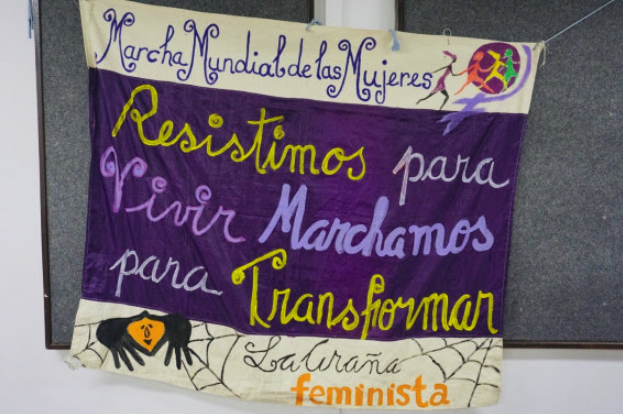
We are diverse women, of different peoples, ethnicities and ages. On International Women’s Day, the March’s activities were marked by this diversity and guided by the call of our 5th International Action. In Venezuela, Araña Feminista joined the March 8 rally, in conjunction with other movements. During the World March of Women speech, excerpts from our call to the 5th International Action were read. “I tried to make clear that although we come from different contexts, women around the world are resisting the same forces”, says Alejandra Laprea, activist from Araña Feminista and WMW in Venezuela. “We all resist the same system that, with different intensity and perhaps different masks, operates both in blocked Venezuela and on poor women in the USA or on Western Sahara. Likewise, it submits women from African countries and poor women doubly invisible in Europeans countries, where they are not supposed to exist”.
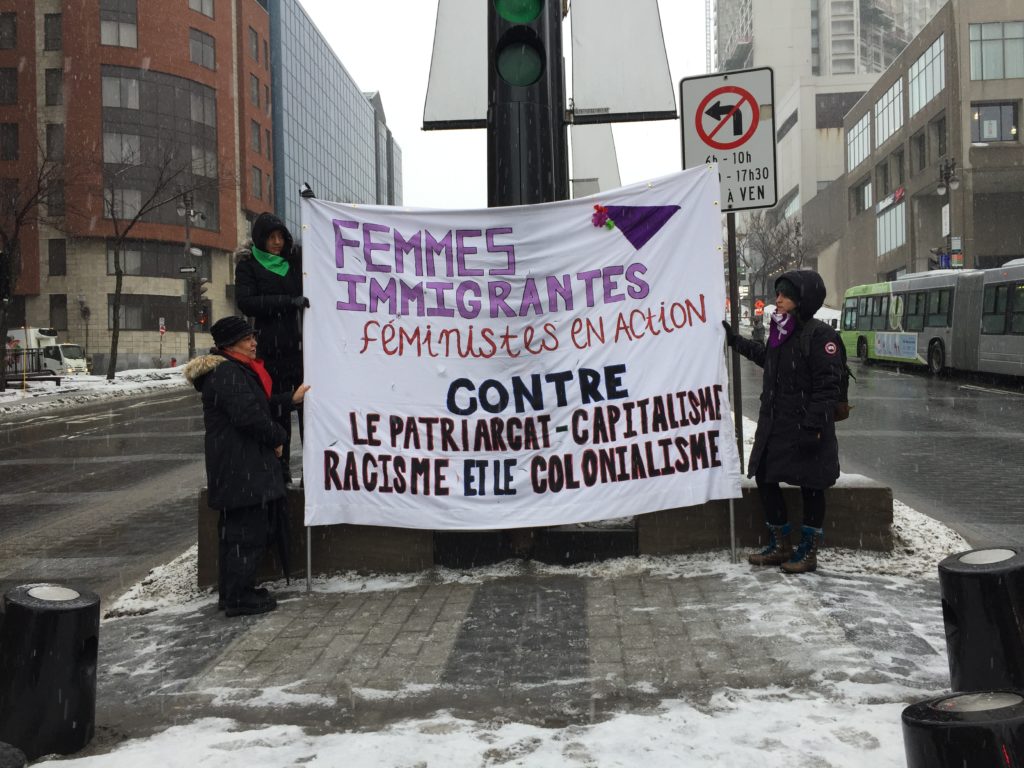
By demanding fair remuneration for female workers, WMW Quebec gave visibility to these poor women in its territory. On March 6, the March Coordination in Quebec officially delivered to the minister responsible for the female condition, Isabelle Charest, a concrete demand for the full recognition of women’s work, with the minimum wage being raised to $ 15 an hour. In a week of actions to give visibility to our struggle, she also manifested herself in support of immigrant women and against patriarchy, racism and colonialism.
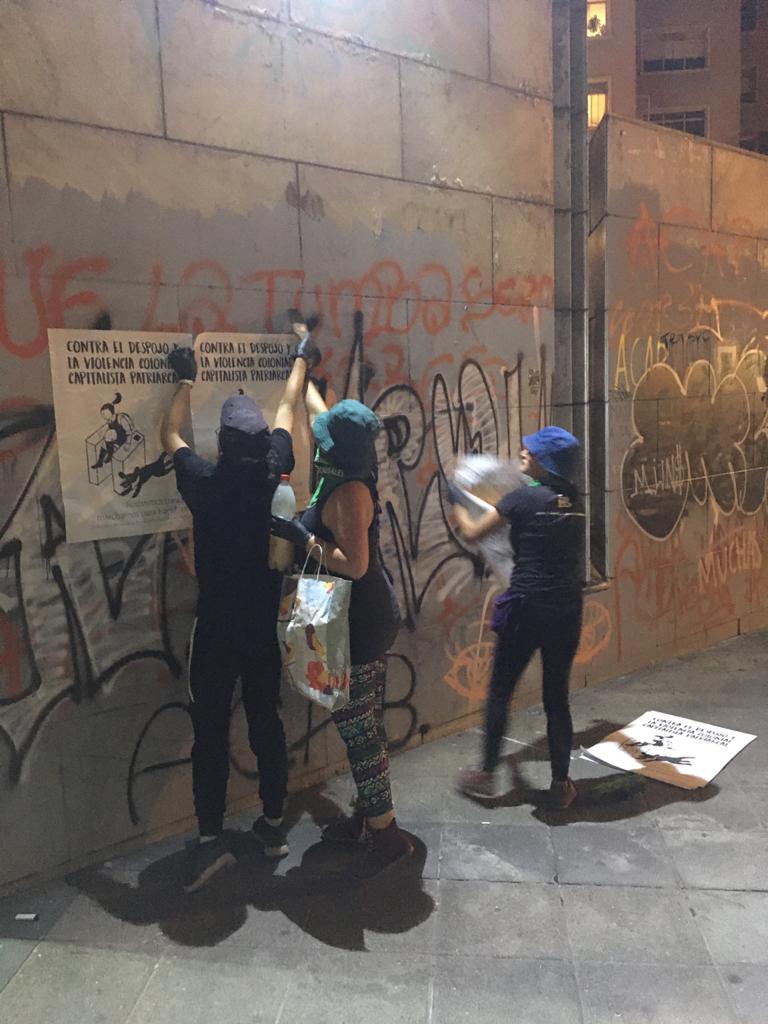
In Chile, with its daily repression, raids, arbitrary arrests, violation of the right to freedom of movement and to information, the appeal for March 8 was launched collectively by many movements for the second year and attracted an immense crowd to the streets. “The most important thing about the collective appeal is that women and feminists have come together to say that we no longer want oppression and inequality as part of this repressive patriarchal, colonial and racist neoliberal policy. We were thousands shouting class slogans and libertarians mottos: we were village women, workers, peasants, natives and artists expressing our rejection of this extraction system and natural goods predation”, said Mafalda Galdamez, from Chile, member of the International Committee of WMW and Anamuri.
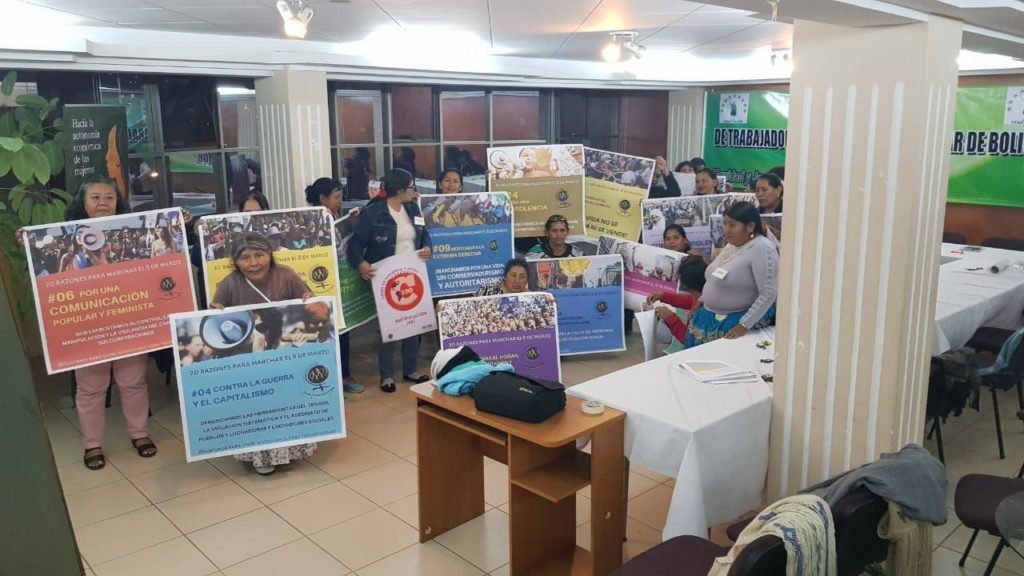
In Bolivia, an unprecedented mobilization on March 8 brought together a great diversity of women determined to resist the ongoing neoliberal, violent and racist coup. “We continue to fight against discrimination, against hatred of indigenous people, of the pollera (the traditional skirt used by indigenous women), of the workers, of the poor and of women” say our companions.
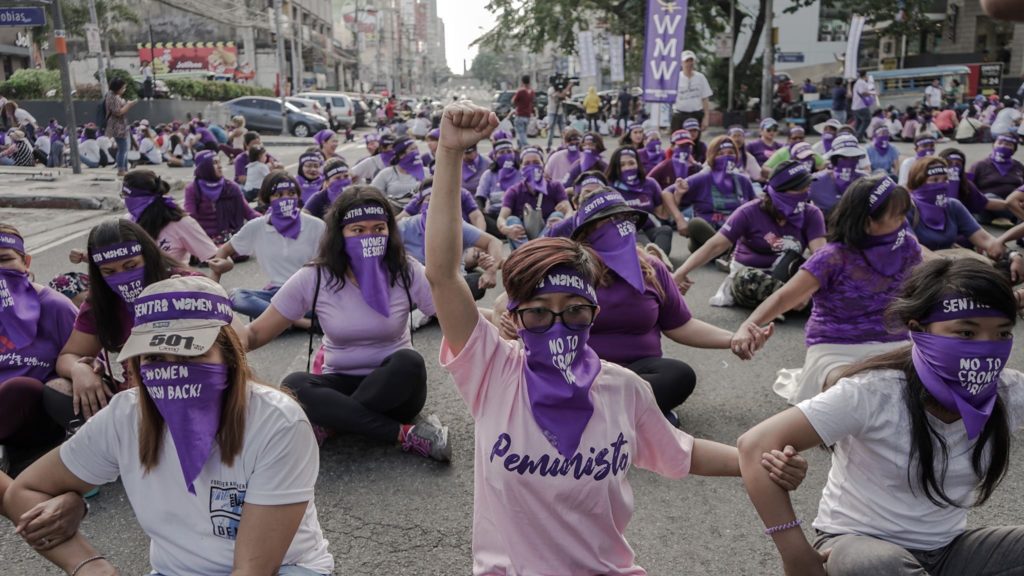
In the Philippines, in the beginning of February, Rodrigo Duterte’s government passed an Anti-Terrorism Law that expands the repression against social movements. As in Chile, El Salvador, Pakistan, formally democratic governments continue to make decisions that attack people’s right to organize. In the city of Quezon, WMW made a demonstration to show that this does not mean greater security for the population. “For us, human security means freedom from violence, both state and gender-based. Security means food on our tables, safe jobs and wages, valuing women’s work, accessible and quality education, indigenous territories free from exploitation, sustainability of life, not commercialization of public services, nature and our bodies!”, declared the companions.
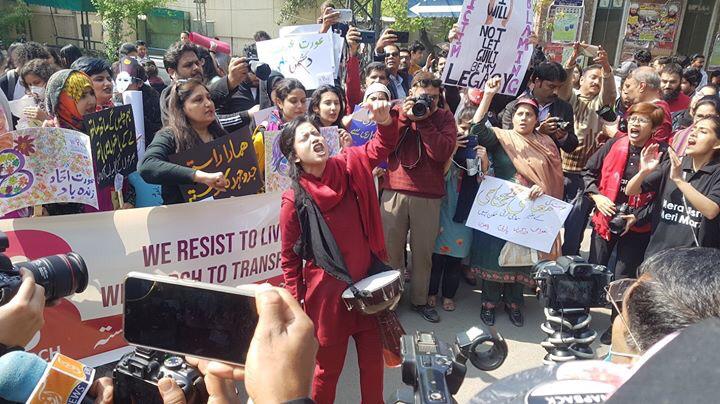
Anti-feminism is part of the authoritarian offensive that we resist. In Pakistan, despite threats from the right wing and attempts to prevent protests in court, demonstrations have taken place in major cities. At the Lahore manifestation, attended by the World March of Women, 5,000 women occupied Egerton Road for more than four hours – and the 5th International Action was launched. “It was a beautiful manifestation and a strong demonstration of women power” says Bushra Kaliq, member of the International March Committee and the organization Wise (Women in Struggle for Empowerment). Loud voice slogans, speeches, theatrical performances and feminist songs were the hallmarks. With the women’s mobilization growth, Pakistan’s religious and ultra-conservative forces are restless and threaten women activists. In Lahore and Islamabad, religious forces organized counter-protests, with women in burqas handing posters with anti-feminist slogans like “Our body, God’s choice”. Our answer in Pakistan and other countries is the struggle.
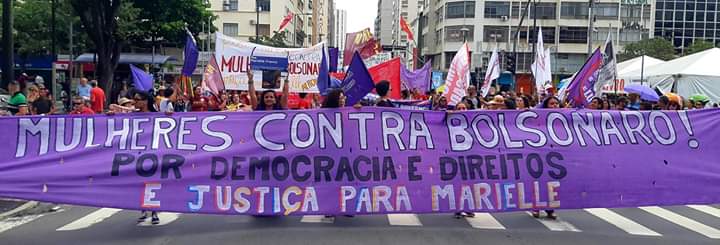
In Brazil, the WMW 5th International Action was launched in 17 states with the slogan “Fora Bolsonaro” [Bolsonaro Out]. Women identify that his neoliberal, misogynist and racist government implements a policy of death, destruction of inclusive public policies, praise for patriarchy and attacks human right defenders. Batucadas [drums and percussion], WMW recovery history, presentation of the political meaning of the 5th action and the proposals women have built to transform life and the economy, such as agroecology, were part of the activities. In many cities, the 5th action launch was unified to large mobilizations called by social movements.
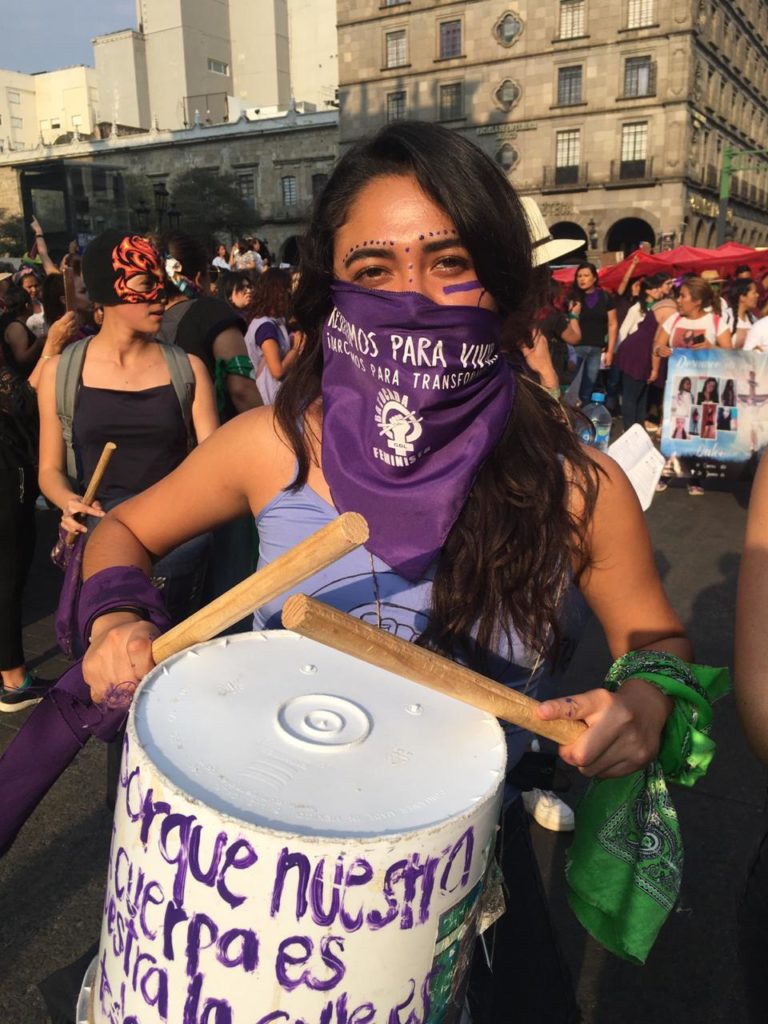
In Guadalajara, Mexico, the demonstration was massive and historic: 35,000 women went to the streets, something unprecedented in the city, for any social movement, tell us our companions. The WMW drumming took part in the acts – just as it sounded on the streets in El Salvador, France, Honduras, Brazil. WMW activist Carmen Díaz Alba spoke to the university community a few days earlier about the movement. She emphasized that this is a marching feminism: “We point out what we don’t want, but also what we want in our lives. We act to build this alternative. We identify women as social change agents”, she said. She also marked that one of the most important achievements of WMW is the establishment of alliances with other social movements in which women participate and to carry out actions articulated in local spheres until generating transnational impacts.
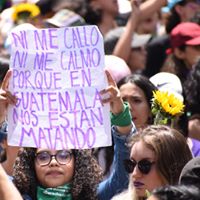
We fight against violence as a structural issue that appears in different causes and expressions. An example is the State of Guatemala, which, like other states, instead of guaranteeing human rights has increased repression and criminalization. Face with these facts, “we invite young women, communities and the population to be indignant, to organize themselves, to express themselves and to take the streets in solidarity, to express their commitment to a society that takes care of life and demands zero tolerance for violence, impoverishment and dispossession of our territories”, stated WMW on March 8.
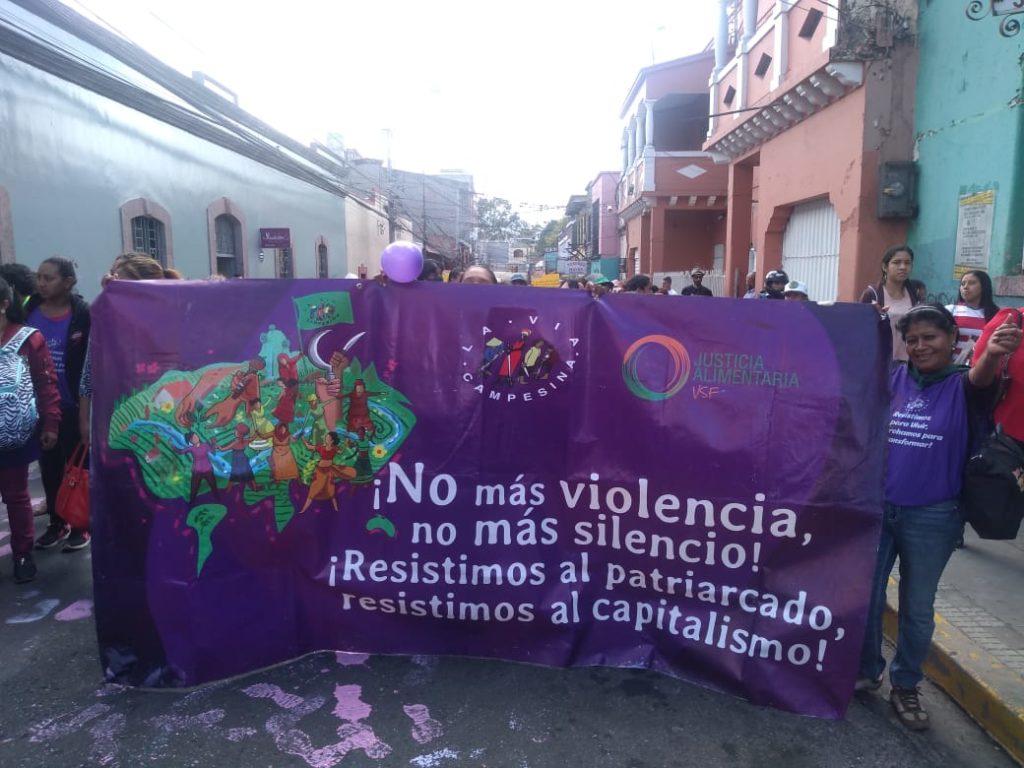
Brazil, Mexico, Argentina, Honduras, El Salvador, Guatemala and Bolivia are the most dangerous countries for women and the Americas are the second most dangerous region for women in the world. In Honduras, the Assembly of Women Fighters manifested itself with the slogan “No more femicide, women’s lives matter!”. Justice for all women, said our companions. Denouncing political violence, the March celebrated the memory and called for justice for women fighters like Berta Cáceres, an activist murdered in 2016 in Honduras, and Marielle Franco, murdered in 2018 in Brazil.
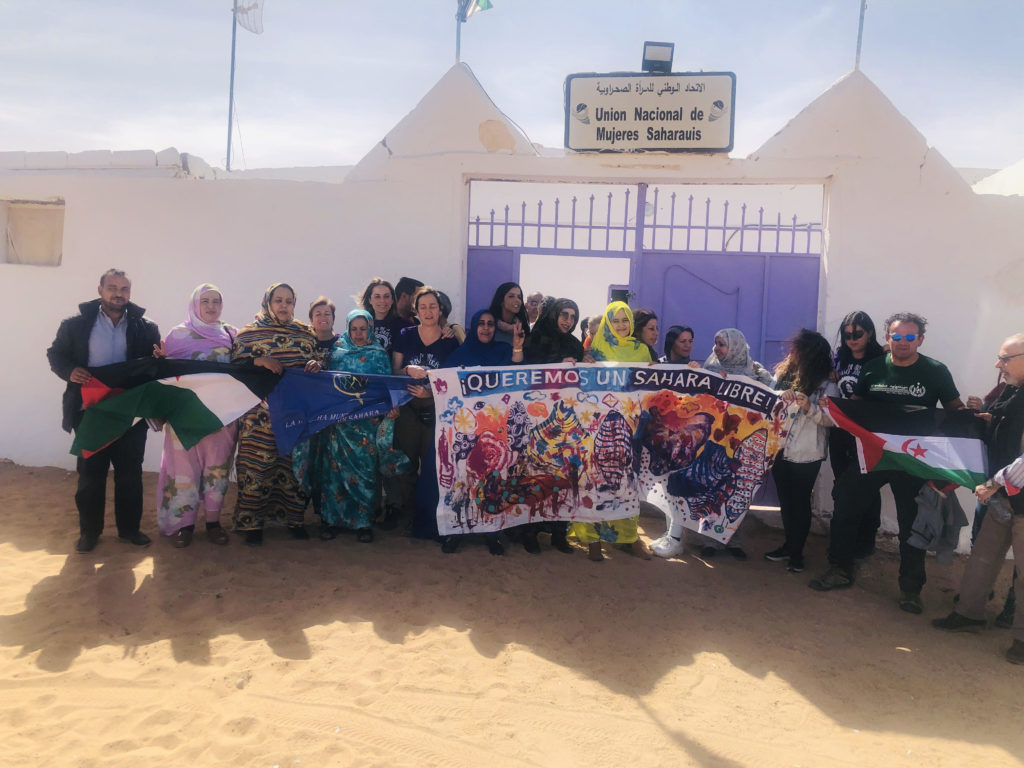
From the Saharawi refugee camps, Saharawi women have marched against attacks on human rights in the occupied territories of Western Sahara. They expressed their solidarity and support for the sisters in the Occupied Territories, beginning with the activist prisoner Mahfuda Bomba Lefkir, who was arbitrarily arrested for expressing her right to freedom and dignity of her people.
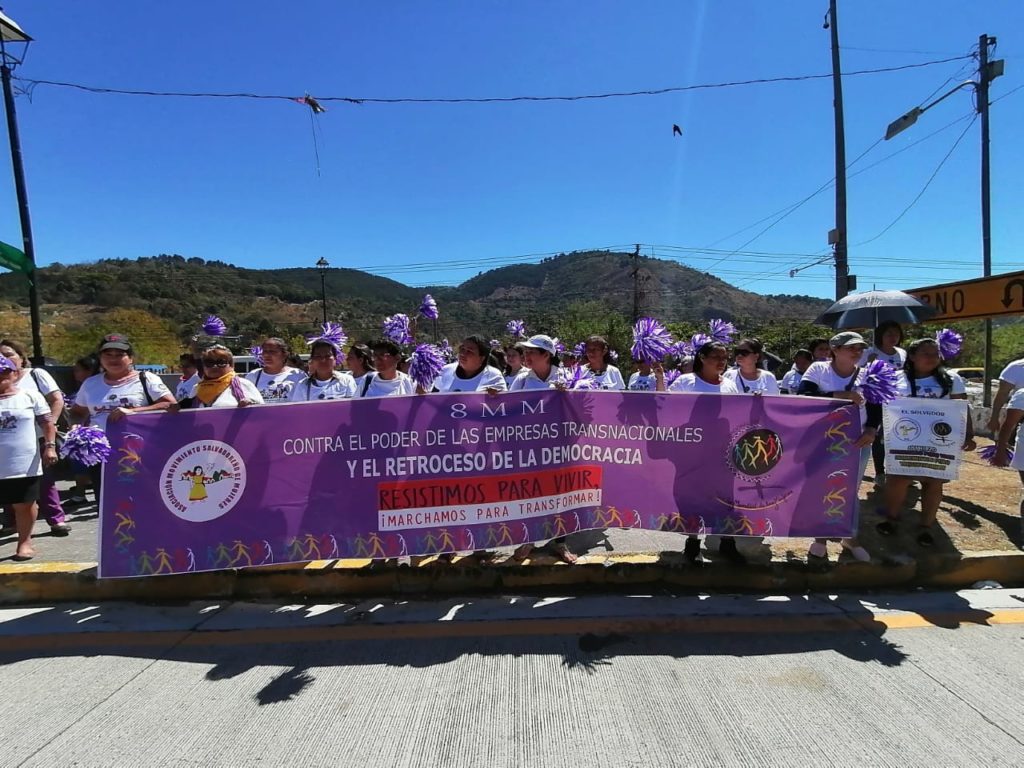
It is about women lives. In El Salvador, the comrades of the WMW participated in the demonstrations of the feminist movements. In the streets, they denounced the setbacks of feminist movements’ important achievements, as the cuts made by Nayib Bukele’s government, which reduced the public budget for programmes to combat violence against women. They also demanded the decriminalization of abortion under special conditions. As in other countries, in El Salvador the law condemns thousands of women and girls to high-risk pregnancies and keeps dozens of low-income women accused of aborting in prison. The demand is for the approval of abortion under special conditions and for the release of women. The demonstrations also denounced the attempted coup d’état in February, the militarization increase and political persecution by Bukele’s government, in disregard of the 1992 peace agreements. Our compagnions know that, in authoritarian regimes, women are the first to suffer. Instead of militarization, they demand job opportunities, decent wages and pensions and a society free from violence.
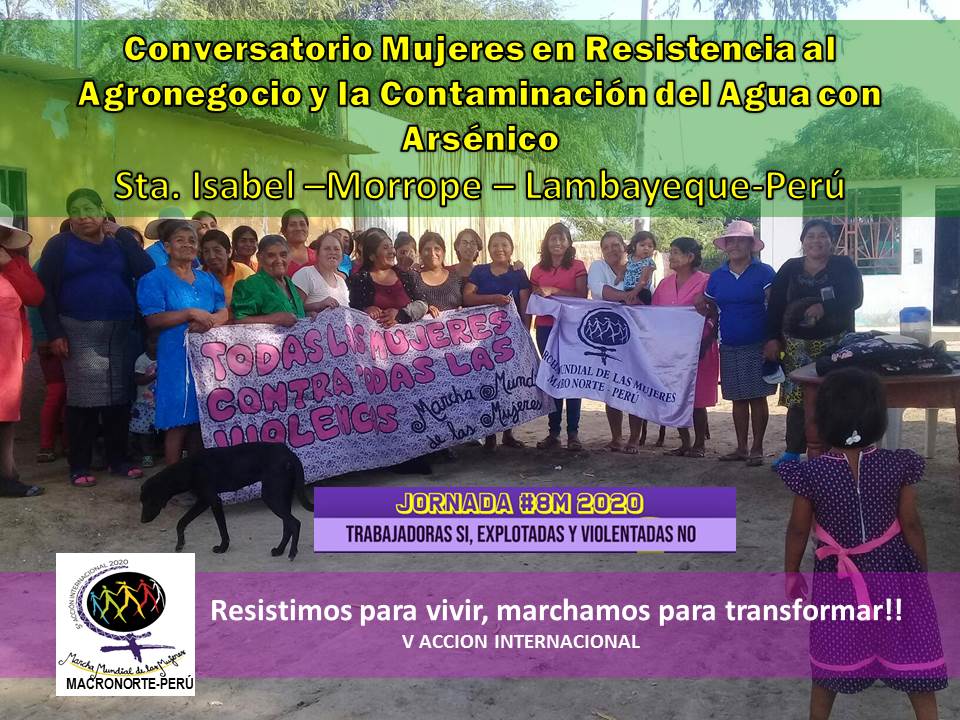
In Peru there were demonstrations in Lima and several other cities, the mobilizations grew and counted on many young women – as in other countries, new generations of feminist women join the struggle. The women of WMW Macronorte Peru mobilized to denounce the progress of transnational companies against common goods, one of the central themes of our international action. They addressed the issue of water access, a common good used by companies to the detriment of populations also in other territories: in Chile, for example, water privatization is one of the causes of popular mobilizations since 2019. In Peru, mining companies contaminate reserves necessary for people supplying. “We women continue to fight. We face the system 24 hours a day, as we are in constant risk scenarios, both on the streets and at home, being an offer for the ferocious patriarchal neoliberalism. (…)”, state our companions, who also say “no” to “extractive activities, agribusiness, religious fundamentalism and transnational corporations in our territories and in our lives”.
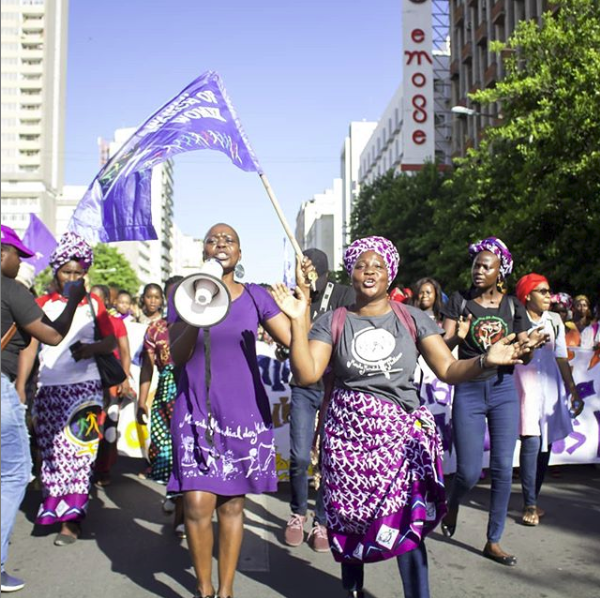
In the city of Maputo, Mozambique, climate justice – the claim for transnationals and banks to take responsibility for their activities that devour the planet, impact workers, the poor, peasants and native peoples – was one of the issues of the protests held by WMW. In Bangladesh, Belgium, Benin, Switzerland, the Basque Country, Galicia, Catalonia and the United States, women of the March carried out mobilizations and activities for the 5th International Action launch.
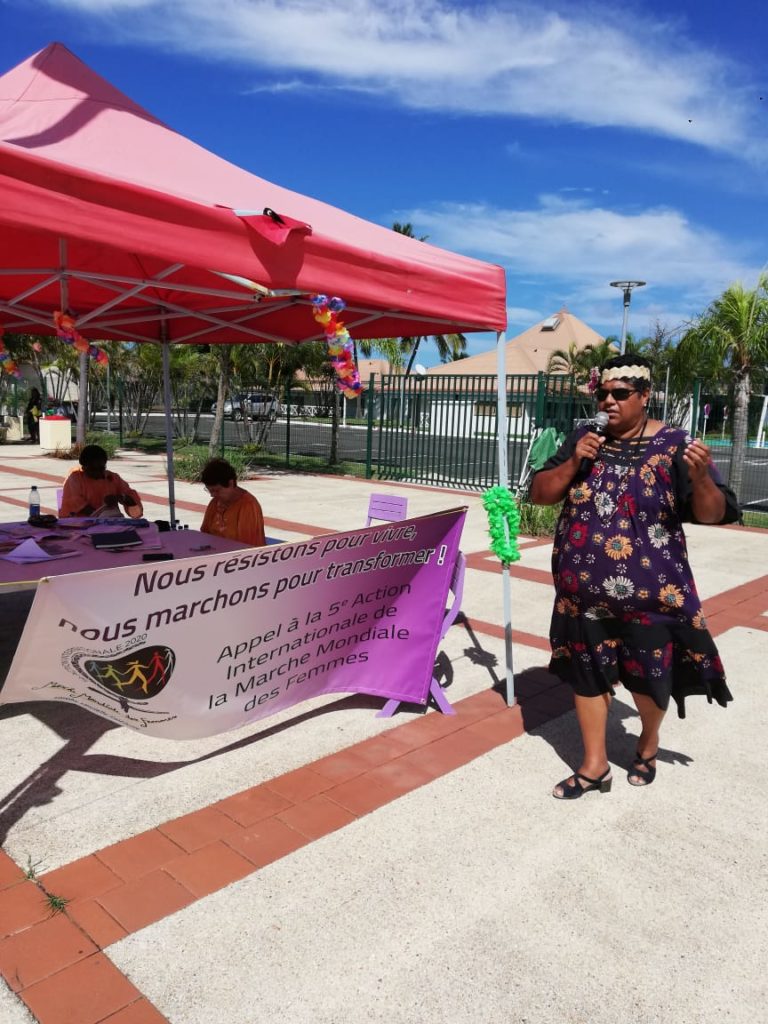
In Le Monte-Dor, New Caledonia, the launch of the 5th Action was carried out on the eve of a popular consultation on the country’s status in relation to France. “The uncontrolled neoliberal economy and the colonial system feed on patriarchal, racist, imperialist domination. It is essential to develop our resistance to reverse inequalities. Here, we question the place, status and rights of women in the constitutional project of our ‘Nation’, on the eve of a referendum that can chance the future of our country”, says Françoise Caillard, of the International March Committee and Association MWA Ni JE.
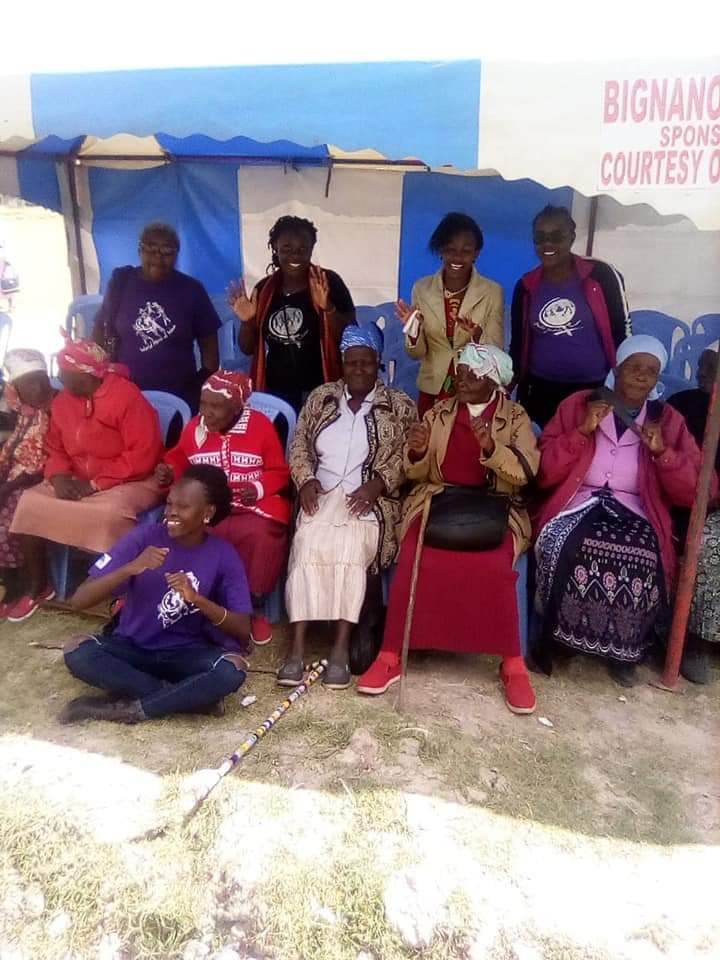
In Kenya, in addition to activities in communities in Mombasa and Nairobi, a football match was held to celebrate our struggles. A feminist match, with women ready to defeat patriarchy. See a record of actions and activities around the world on the pages of the World March of Women on social networks.
It has only been four weeks since International Women’s Day took millions of us to the streets. Now, an increasing number of women live and denounce the risk of coronavirus and everything that the pandemic opens up about authoritarian and neoliberal capitalism: the lack of investments in public health, the inequality that forces women to work at risk or lose their income, the violence of the States which now take restrictive measures for health reasons, but add to the package initiatives of population control and repression. We witness the repeated transfer of wealth to the oligarchies, instead of its distribution and the protection of the majority of the populations. And the domestic violence that threatens women who are closed at home with potential aggressors. We have new challenges in our struggle for life appreciation and sustainability, for public health services, for the recognition of care work as well as the sharing of this kind work across society, for a real democracy.
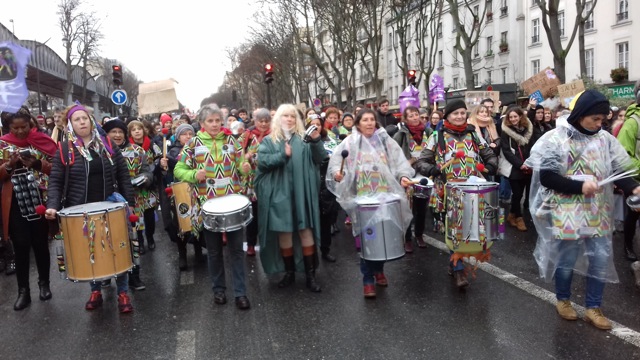
We continue to fight for a world in which life is at the center. A life worth living. Therefore, we register here our fight and the beginning of our 5th International Action. As our comrades from the March in France say: “March 8 should not be a day without tomorrow. Thanks to the mobilizations of feminists, in France and internationally, this day of taking the streets is a privileged moment to make visible the permanence of our struggle – which force has been present throughout history and in our daily lives. It bears the mark of rebellion and dreams. “We continue in action to build a society based on values such solidarity, freedom, equality, peace, justice, a society that respects our lives and the planet.
In the year 2000, when we stood up against neoliberalism with people from all over the world, in grassroots women groups from different countries and territories, we created a platform to combat poverty and gender-based violence. In 2005, March groups wrote the Women’s Charter for Humanity, which presented the five values for the world that we want to build: peace, freedom, justice, solidarity, equality. A large quilt was made collectively by the hands of women from each country and territory where we are organized, practicing international feminist solidarity and showing the strength of women on the move. In 2010, we launched the slogan that resonates in the streets until today: “We will march until all of us are free”. In 2015, the strategy of the 4th International Action was to reinforce resistance to the advance of capitalism over our territories, our bodies, our work, our place of life and action. The next date on the 5th International Action calendar was March 30, the Palestinian Land Day, when we carried out activities and protests in solidarity with the Palestinian, Kurdish, Kashmir, Saharawi, Basque and Catalan women struggles, as well with so many others around the world who fight for the right to self-determination , against militarization and war. See here the other dates of our calendar.
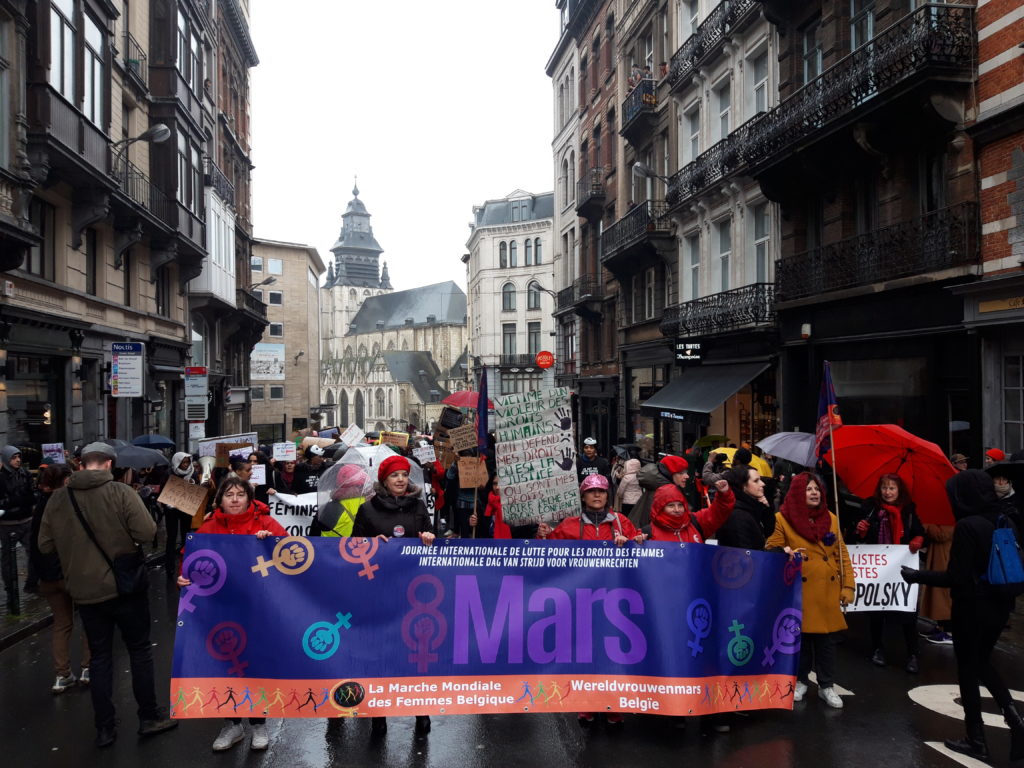
Our international actions have been, since year 2000, moments of mobilizing everyone, connecting our processes and struggles with the global strength of feminism in movement and with our own memory and strength. They are moments of construction and expression of our political syntheses, of articulating from the local, regional and international levels and presenting our claims, proposals, actions. Our companions’ information about each territory shows us, once again, how strong we are when we march together. Looking at the women’s movement around the world, we recognize our symbols and political identity and the need to follow with the construction of the World March of Women, this permanent and struggling feminist movement, anti-capitalist and anti-racist.
We resist to live, we march to transform!
#WMWinAction2020
